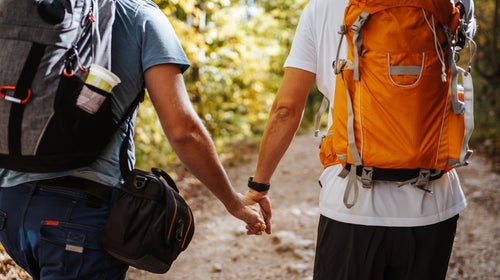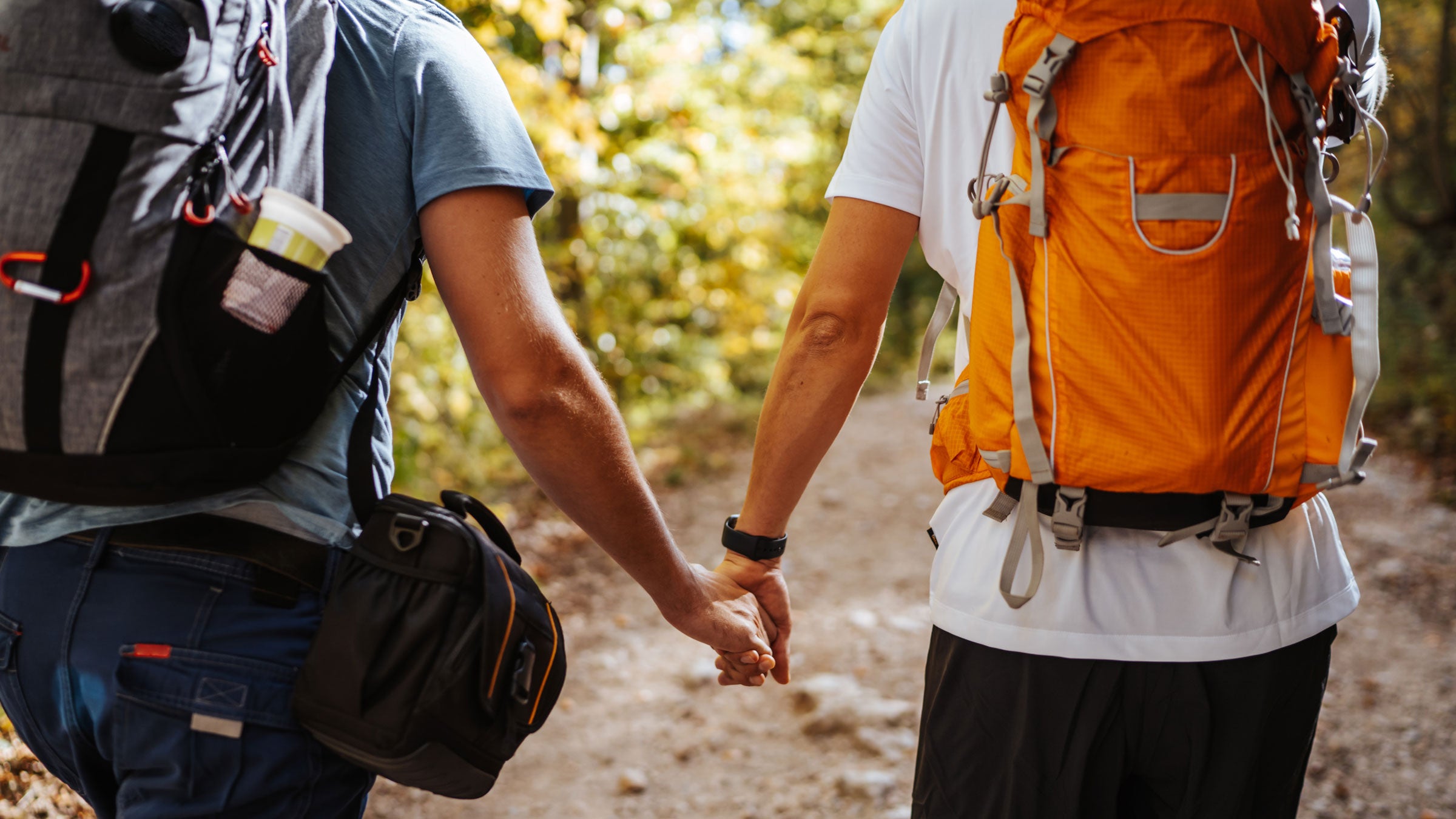The first time I teetered to the top of a fourteener, I spent the descent daydreaming about a second kind of mounting. (Yes, I’m talking sex here.) But after I’d downed my celebratory kombucha at the base, climbing on top of my partner was the last thing I was in the mood for.
As personal as it seemed, my lack of interest in sex after my taxing trek wasn’t just a me problem. It’s a fairly common phenomenon among outdoor aficionados who train long and hard. Research indicates that too much or too little exercise can make sex unappealing.
Exercise adheres to the “Goldilocks principle,” explains Lyndsey Harper, MD, the founder and CEO of Rosy, a sexual health wellness technology platform. Like in the well-known fairytale, it’s all about finding the right balance.
Why Outdoor Activity Supports Your Sex Drive
Exercise impacts sex drive in a number of ways, according to Harper. For starters, movement supports the circulation of blood throughout the body, she says. “Blood flow to the genitals is the first physiologic step in arousal,” says Stephanie Hack, MD, the founder of the Lady Parts Doctor podcast. If you have good circulation as a result of your exercise routine, she explains, you’re more likely to have steady blood flow to your genitals.
You may turn to your sport to boost your mental wellbeing. But those minutes on the bike or the trail do more than alleviate your anxiety; they also boost your sex drive. For most people, stress is the ultimate libido killer, says Rachel Wright, a psychotherapist and host of the The Wright Conversations podcast. Typically, when you feel tense, your body prioritizes acts of survival— like sleeping, eating, and hydrating—over acts of procreation or pleasure, like sex, she says. Exercise can be a healthy outlet for stress, of unwanted anxiety. But it also goes beyond that, contributing to your mental health—and sense of self.
“A regular movement practice is tied to an improved sense of self-image and self-confidence,” Harper says. A 2016 study published in found that physical activity had a direct, positive relationship with participants’ self-esteem. When an individual finds a movement practice that makes them feel more sure of themselves, it’s common for them to notice an increased interest in solo, partnered, and multi-partnered play, Wright says.
In general, a lack of physical activity is linked with decreased libido, a broad term for an individual’s interest in engaging in sex, experiencing sexual intimacy, or achieving orgasm. One observational study from 2018 published in the found that 43 percent of sedentary women and 31 percent of sedentary men experienced sexual dysfunction. The researchers defined this as a loss of sex drive or or arousal as well as erectile dysfunction.
How Too Much Outdoor Activity Can Interfere With Your Libido
Incorporating a trail walk, mid-day hike, or mountain biking loop into your routine can improve your libido, especially if the furthest you walked that week was from the couch to the fridge. If you’re lacing up multiple times per week, your sex drive will likely increase.
But, respectfully, outdoor athletes are known for being obsessed with their sport of choice. You could probably talk about your last hike for longer than it took to summit the dang thing. While spending tons of time doing what you love sounds glorious, there are instances when all that outdoor action could hurt your performance in the bedroom.
“You can definitely have too much of a good thing, and that stands with exercising, including outdoor exercise, ” Harper says. There are a number of mental, emotional, and physical side effects of overdoing it, such as increased pain, a loss of performance—and a libidinal lull.
In a 2017 study published in , researchers linked regular high-intensity and long workouts with “significant” decreases in men’s libido. By regular, these researchers do mean regular — nearly 60 percent of the 1,100 study participants exercised for at least 7 hours per week. Additionally, a 2009 study published in the found that male endurance athletes who trained long and hard had decreased sperm counts and testosterone levels, compared to peers who didn’t. There does not appear to be a corresponding study conducted with female athletes. However, found that decreasing levels of estrogen in women can lower their libido.
“Intense exercise training can lead to a decrease in your sex hormone levels, which is a condition called ,” Hack says. The (testosterone and estrogen) are modulators of sex drive. When they dip, so can your sex drive, she says. Additionally, in some instances, if you’re exercising frequently and failing to properly rest, you can develop , Harper says. This condition impacts your endocrine (hormone) system, nervous system, immune response, and sex drive, she says.
However, a libido dip in a serious outdoor athlete is not always indicative of a medical condition. “Sometimes all that physical activity just makes you tired,” Hack says. It’s normal, she says, to get home from a long ride or route and feel more inclined to Netflix and chill literally, rather than figuratively.
How To Balance Your Outdoor Sport Aspirations And Your Libido
To simultaneously peak in performance and pleasure, consider these six recommendations for maximizing both your physical fitness and your sex drive. Because it is possible to have a thriving training schedule and sex life at the same time.
1. Be patient with your body
“It is very normal for your libido to fluctuate,” Hack says. If you feel frustrated with the state of your current sex drive, wait this lull out.
In addition to activity changes, your relationship status, relational happiness, alcohol and drug intake, and general health can also impact your sex drive, she says.
2. Consider your priorities
Balance isn’t just the thing you need when scaling a mountain. It’s also what helps you maintain a healthy sex life. “As with everything in life, the key to personal success comes down to balancing your priorities to favor what’s important to you,” Harper says.
Ask yourself: What do I most value? In some cases, you may have to cut back on the time and energy you dedicate to other pursuits in order to increase your libido.
3. Recover as much as possible
According to Harper, you may find your libido dropping when you’re not fueling properly. Evolutionarily speaking, when you’re in a calorie deficit, your body is programmed not to crave sex. That’s because it interprets the lack of incoming nutrients as a sign that there aren’t enough resources available to sustain another individual, Harper says.
She recommends working with a sports nutritionist to make sure your diet supports your exercise and sexual health goals.
4. Keep a training journal
You may already be keeping a journal where you document your latest workouts. However, if you also want to monitor your libido, Harper recommends noting changes in your sex drive in the same training log. “Keeping track of both in the same place can help you understand how, if, and when one supports or detracts from the other,” she says.
5. Communicate with your partner
If you’re serious about your outdoor pursuits, odds are that your partner(s) knows that about you. In the same way you talk about your training and races, you can chat with them about your libido changes, says Wright.
“After your share, invite your partner(s) to continue the conversation with you by asking them if there are other things you can do to help them feel cared for while you’re having less sex,” she says.
6. Talk to a healthcare provider
If your typical workout schedule hasn’t changed, but your libido has, it might be time to chat with your doctor. Certain medications, including antidepressants, testosterone-blockers, and diuretics, may contribute to a loss of libido. Additionally, in some rare cases, a decrease in sex drive can be symptomatic of
Ultimately, a healthcare provider can help you discern if there are any other medical reasons for your lowered libido, Hack says.


